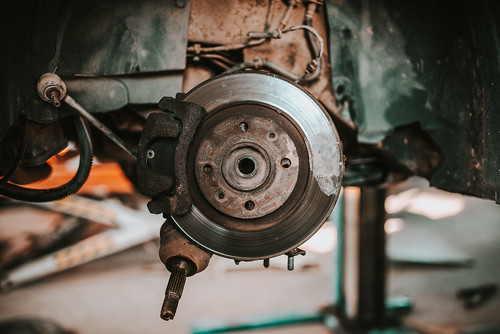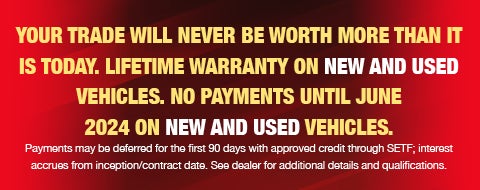Your car’s braking system is one of the most crucial components of your car, and the safety of you and your passengers depends on it. If any of the components of the braking system fail, it can lead to brake failure, which can be catastrophic. It’s very rare, however, for brakes to fail without some kind of warning signal, and knowing what signs to look and listen for is important.
If you live or work in Jacksonville or the surrounding areas of North Florida, you can bring your car to Keith Pierson Toyota to have your brakes checked and serviced by our professional technicians. Here are some of the odd noises your brakes could make and what might be causing them. If you hear any of these, it’s time to have your brakes looked at.
Causes of Squeaking Brakes

You may hear a squeaking or squealing noise from your brakes the first few times you press the pedal when you start driving in the morning, especially if it has rained overnight, but it might be nothing to worry about. If you’re lucky, it could just be the brake pads scraping a thin layer of surface rust from the brake rotors. Sometimes, high humidity can also cause moisture and dirt to stick to the surface of the rotors.
If the squeaking stops after a short time, you’ve cleared the problem at no expense. If the squealing happens each time or most times you brake, though, or if there is a continuous squeak when you’re driving, you may have a more serious problem, and the remedy is going to cost you more.
Brake Pad Wear
When your brakes squeal continuously as you drive along the road, but the squealing stops when you press the brake pedal, the most likely cause is the brake wear indicator touching the rotor’s surface. Brake pads have a small metal tab built into them, and as the pads wear out and become thinner, this comes into contact with the rotor and make a noise to warn you that you need new brake pads. Have your pads replaced as soon as possible, because ignoring this warning sign will lead to a bigger, more expensive repair.
Inferior Brake Pads
Another common cause of squeaking brakes is cheap and inferior brake pads. Lower-quality pads contain metal flakes that can drag along the rotor and make a squealing noise when you apply the brakes. While saving money by fitting cheap pads might seem like a good idea at the time, that annoying squeak will make you wish you’d spent a bit more. At our service center, we fit only high-quality, manufacturer-recommended parts to ensure the safety and efficiency of your braking system.
There are several other possible causes of squeaky brakes, such as sticking or loose calipers or worn components. If the noise doesn’t stop, bring your car to Keith Pierson Toyota in Jacksonville, and our experienced technicians will inspect your braking system and diagnose the problem.
Grinding Noise When Braking
If you hear a loud grinding noise when you press the brake pedal, it generally means your brake pads have completely worn away and part of the caliper is coming into contact with the rotor. When your pads have no braking material, and you’ve got metal on metal, your brakes won’t be able to stop your car. Regular brake service will pick up on badly worn pads, which is a relatively cheap repair. But if you wait until your brakes start to grind, you’ll probably also need new brake rotors, which will be quite a bit more costly.
Grinding brakes can also be caused by an object like a stone getting lodged in the caliper. This could cause a continuous grinding or squealing noise as you’re driving along. If you can find a safe place to pull over and drive your vehicle backward and forward several times, you can sometimes work the object free. If this doesn’t work, bring your car in and have our technicians take a look, as ignoring this can lead to an expensive repair.
Thumping Rear Brakes
Many vehicles feature drum brakes in the rear, and these can experience their own problems. With drum brakes, a shoe presses on the inside of a drum to stop the car, and the inside of the drum can be skimmed on a lathe to repair the braking surface. The procedure leaves an almost invisible groove on the new surface, which the brake shoes follow like a needle on a record.
If there’s a break in the groove, the shoe will jump back and hit the backing plate, causing a thumping sound. It sounds worse than it is, but you’ll wonder if it’s safe to drive the car. The drum’s braking surface can be sanded down to smooth out the groove, which is an inexpensive repair. If the damage is worse, the drums will need to be replaced.
Rattling Brakes
Rattling brakes is a fairly common problem that typically happens when you take your foot off the brake. It’s usually caused by the brake pads being affected by heat expansion. If the rattling happens when you apply the brakes or if it’s continuous, however, it could be a sign of something more serious, and you need to have your brakes checked.
Brake Repair and Replacement in Jacksonville
You can prevent problems with your car’s braking system by scheduling a regular brake service. When you bring your vehicle to our Jacksonville service center for regular brake service, our technicians will check and replace the brake pads if necessary and check brake fluid. They’ll also check the entire braking system for potential issues, such as leaks or corrosion, that could become bigger problems in the future. Early detection and remedy of problems could save you money on future repairs.
Contact us at Keith Pierson Toyota today, schedule a service appointment online, or come to our conveniently located service center at 6501 Youngerman Circle in Jacksonville, FL and let us see what we can do to keep you safe on the road!






